Friedrich Nicolai’s Vertraute Briefe von Adelheid B**,
Athenaeum, and Caroline as a Romantic Coquette [*]
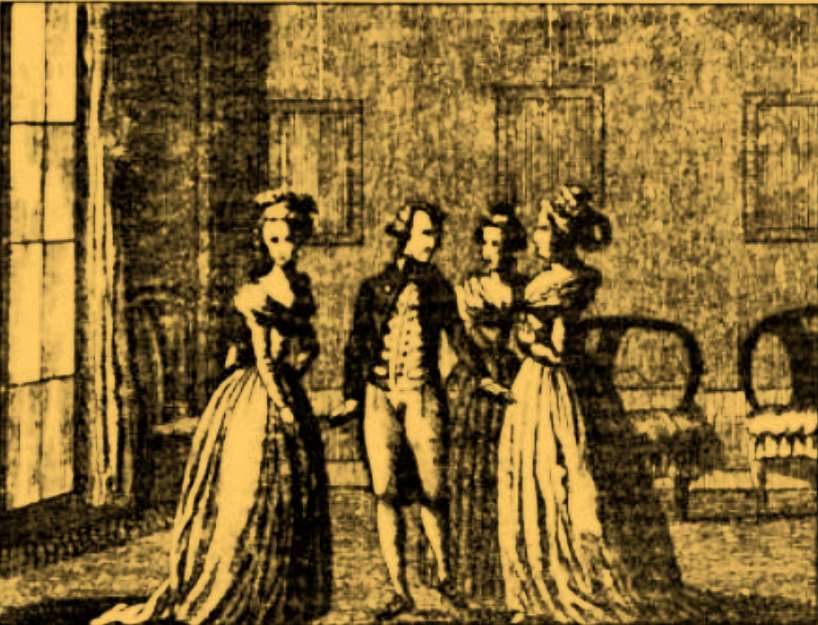
I. August Koberstein’s synopsis; Athenaeum passages contra Nicolai; II. Ludwig Huber’s Review of Vertraute Briefe von Adelheid B**; — III. The Romantic Coquette Frau von C**.
I. August Koberstein’s synopsis; Athenaeum passages contra Nicolai.
Friedrich Nicolai’s Vertraute Briefe von Adelheid B** an ihre Freundin Julie S*** (Berlin, Stettin 1799), an anti-Romantic epistolary novel that appeared in early 1799, had employed the device of weaving together citations from Athenaeum even before August von Kotzebue’s Der hyperboreische Esel. [1] August Koberstein, who provides an exhaustive presentation of the resulting feud, begins his discussion with the following preliminary remarks: [2]
The story’s protagonist is a young man not without talent who has just returned from the university full of philosophical and belletristic conceit. In the letters his sister-in-law, Adelheid, writes about him, he is alleged to have said in conversation with her all sorts of things found in the “Fragments.” [3] Polemical remarks are also leveled in Nicolai’s customary manner against Fichte as well as against the philosophers of Idealism generally; Tieck, too, is pilloried as the puss ‘n boots allegedly strolling about on the roofs of the dramatic arts. [4]
Though the author chose to remain anonymous, everyone soon realized it could be none other than Nicolai, and with the appearance of this book, the war between the opponents and founders and adherents of the new school broke out in full force; a favorable review of Nicolai’s novel in the Jena Allgemeine Literatur-Zeitung [5] . . . prompted A. W. Schlegel’s withdrawal from this journal and resulted in a complete break between the Romantics as such with the journal’s editors. [6] Through these same attacks, however, the novel’s author, who was already at odds with Tieck as well, himself became subject to humoristic ridicule and crude chastisement, viz. by the elder Schlegel in the “Litterarischer Reichsanzeiger” in Athenaeum, by Tieck in Zerbino and his Poetisches Journal, [7] and by Schelling in the annotations concerning the Jena Allgemeine Literatur-Zeitung. [8]
Koberstein mentions the various competition and satirical pieces against Nicolai in the “Litterarischer Reichsanzeiger oder Archiv der Zeit und ihres Geschmacks” in Athenaeum (1799), beginning with the following: [9]
The bookseller Nicolai the Elder, in a most ill condition, recently saw all sorts of strange spirits and now longingly wishes to see his own as well. Any scholar who can direct him to the means by which he might carry out this difficult task is promised a commensurate reward.
Koberstein also mentions the following piece from the “Reichsanzeiger”: [10]
Medical Announcement
Philosophizing is an albeit rare, though in certain forms extremely worrisome and dangerous illness that afflicts hopeless young men. A wondrous, continuously vehement delirium, a consumptive aversion to water that affects especially the organs of speech, utterly dessicating them, and a usually irreversible incapacity to produce comprehensible works and moderate reasoning, or even to enjoy such with propriety and taste: such are the most customary ills arising from this source, ills no sensible man capable of appreciating the good fortune of sound health can view without sympathy.
Unfortunately, it is common knowledge that quite beyond these considerations, many otherwise wholly healthy young people imagine that they are suffering from this illness, and that this particular type of hypochondria, whose cause has quite justifiably been sought in the extraordinary atmospheric disposition of our present decade, deprives the literary commonwealth of just as many quite excellent minds as does the actual illness itself.
The conviction is thus that one might perform a not inconsiderable service not only to everyone sincerely concerned with what is best for German literature, but also to all true friends of youth by drawing attention to a remedy that has proven its efficacy against these two ills that are so often treated quite incorrectly.
To wit, we are referring to the already considerably extolled
antiphilosophical effectuary [11]
concerning whose considerable efficacy in the most complicated cases one might adduce the most credible testimonials. No chemist has yet succeeded in discovering the true composition of this essentially quite simple remedy, since everyone is deceived by the taste of healthy common sense and mature experience that is indeed a wholly artificial constituent part of this medication, and the public has thus been warned against everything that has been said about such.
Although some have indeed complained about the repugnant tenacity and great volume of this excellent medication, they can be credibly assured that the surging effervescence that unavoidably accompanies this particular composition is such that no other form can really be offered, and that these particular symptoms are in fact indicators of the highest quality and excellence, reason enough for the inventor to be constantly endeavoring to enhance precisely these qualities.
This effectuary is assiduously fabricated in Friedrich Nicolai’s laboratories in Berlin and Schöneiche [near Berlin] and is available in all bookstores and second-hand stores; the entire dosage in seventeen volumes costs 5 1/2 Rtl. half doses without the travelogue [12] cost 2 2/3 Rtl. No special instructions are needed, since it is rather difficult to take too strong a dose, and one might in general remark that while taking this medication a patient should remain on a meager diet, and that the writings of Herr Schwab and Herr Eberhard can be taken alongside as a sudorific. [13]
Finally, Koberstein adduces the following announcement in the “Reichsanzeiger”: [14]
Discovery
In a treatise recently presented to the Royal Academy of Sciences in Berlin, Herr Friedrich Nicolai, in utterly refuting transcendental idealism, discussed a distinction between appearances and the thing-in-itself that, because based on personal observation, is utterly incontestable. If something disappears when a person has six leeches placed on his anus, then it is a mere appearance; if it remains, then it is a reality, or which is one and the same in his language, a thing-in-itself.
Notwithstanding the academician believed that this remedy had thoroughly cured him of an illness during which he saw all sorts of phantasms walking about before him, perspicacious connoisseurs claimed to have discerned that in his treatise, it was the author’s own “lively imagination” that was ghosting about, an imagination that was obviously not a thing-in-itself, nor a reality, nor even a legal, proper appearance, but rather merely a phantasm itself. Hence the resolution was made to renew the cure, and the leeches were immediately applied once more.
The desired effect was achieved: the patient now realized that what he had previously taken to be his own lively imagination was nothing more than mere hemorrhoids ; he also admitted with considerable shame that his more recent writings, in which he tried to suction a leech onto the works of the most excellent contemporaries, including Goethe, Schiller, Kant, Schelling, etc., the leeches, however, having falling off impotently in each instance, — that these writings must have arisen merely from an imitation, darkly sensed, of this very same medical remedy he lacked, and he requested that any remembrance of these ill symptoms be extinguished to whatever extent possible. The Academy, one hears, is willing to do its part in withdrawing these writings from public view, and to this end intends to take them up into their own mémoires.
It was in connection with this feud that Friedrich Nicolai began referring to the new school as a “clique.”
II. Ludwig Ferdinand Huber’s Review of Vertraute Briefe von Adelheid B**.
Ludwig Ferdinand Huber’s review of Nicolai’s piece appeared in the Allgemeine Literatur-Zeitung (1799) 343 (Saturday, 26 October 1799) 246–48:
Those who have had the opportunity to see and become annoyed by the exclusive wisdom of various young philosophers, by their scholarly egoism and arrogant disregard for civil circumstances and customs, in a word: by the signs of the times — will, while reading this novel, praise the satirist who was able to focus so sharply on these things and castigate this foolishness with such wit and humor. Far be it from the present reviewer to deny that the work does indeed contain its share of exaggeration, or to deny that some of the propositions of the newer philosophy have been misunderstood — perhaps intentionally.
But one must be willing to grant the satirist the right to exaggerate a bit; a gentle touch cannot heal the transgression. A young man of talent returns from the university full of philosophical and belletristic conceit, and it is with this return that these letters begin, which his sister-in-law, Adelheid, widow of his deceased brother, write to a lady friend and whose topic is our hero. Adelheid had earlier thought much of him when he was a boy, and even now she still recognizes his not inconsiderable talents, talents merely incorrectly guided, and it is for this reason that she describes his actions and behavior so thoroughly.
Indeed, she resolves to improve him. The stepwise progression of her efforts is described with considerable subtlety, how she first improves his handsome external appearance, then introduces him to society to make him more humane, then awakens in him a longing for specific activities, and finally also prompts him to find satisfaction in bourgeois activities. The mere idea of having a noble woman set such a distorted person aright is an excellent one. Quite unnoticed, however, love manages to take hold in both hearts, the pupil’s lofty respect for his teacher transitions into love, and she, too, carries away a wound after keeping such constant company with him.
The pupil, Gustav, now formally seeks the hand of his teacher. But the life wisdom she enjoys over and above that accorded him guides her here as well. She is nine years older than he and can foresee that his love would gradually cool because of this unequal relationship. Hence she resolves to act for him, and since he has occasionally exhibited a certain inclination for another young girl, she resolves to sacrifice herself to make him happy through the hand of the young beloved. The superiority her own life wisdom and experience give her over her beloved, who in his own turn is still inordinately subject to imagination and speculation, is also portrayed with considerable subtlety and skill.
She herself woos for him, seeking Amalie’s hand after helping him secure the position of a Hofrath, and resolves with the most noble resignation to reside with her friends, raise their children, and rejoice in their love. But the weight of this sacrifice oppresses her more severely than she will admit even to herself; she falls into a kind of melancholy and dies after several years. Although one can see how purposeful is the story in which the author cloaks his loftier goals, at the end we would prefer to see poor Adelheid not die, but rather find comfort in the awareness of her good deed, all the more so because until that point the novel is rendered more in a light and humorous genre, one with which this death excessively contrasts.
The delivery is light and pleasant, though since Adelheid is portrayed as a lady of status and lofty culture, that delivery should be a bit more noble itself, and the author should especially have avoided several overly coarse metaphors and expressions. As far as his opinions are concerned, let us repeat that we do not acknowledge everything here as the truth, but that in such cases we are certainly prepared to pardon the author. [15]
III. The Romantic Coquette Frau von C**.
Nicolai’s Portrait of the Romantic Coquette Frau von C**
in Vertraute Briefe von Adelheid B** an ihre Freundin Julie S**
Jacob Minor provides the following introductory remarks, in part repeating, albeit in a different context, the plot summary: [16]
From the same perspective that served as the point of departure for Nicolai’s polemic against Schiller, he also came into conflict with the Romantics. Notwithstanding he had just previously viewed the elder Schlegel as a young man of magnificent talents, and the younger as an excellent intellect, in the eleventh volume of the Beschreibung einer Reise durch Deutschland und die Schweiz he reckoned them among the utterly wrongheaded, at least Friedrich Schlegel, whom Nicolai additionally, and in a fatherly fashion, warned against misusing Kantian terminology, since such an affection would allegedly . . . ruin his otherwise admirable writing style.
The two brothers are then treated in the Correspondenz zwischen dem dicken Manne, Sempronius Gundibert und Friedrich Nicolai [Berlin, Stettin 1799] in a more unequivocal and less well-meaning fashion, with both the reviewer of the Allgemeine Literatur-Zeitung (August Wilhelm) and Lessing’s critic (Friedrich) being subjected to repeated derision and criticism. But it was only when Friedrich’s Athenaeum fragments and Schleiermacher’s Vertraute Briefe über Friedrich Schlegels Lucinde zur richtigen Würdigung derselben [Lübeck, Leipzig 1800] clearly revealed the free morality of the young school did Nicolai feel himself called — as the guardian and educator as which he could not help viewing himself — to issue an energetic warning to his beloved Germans.
Picking up on the title and form of Schleiermacher’s letters on Lucinde, allegedly composed by a lady, in 1799 he wrote the Vertraute Briefe von Adelheid B** an ihre Freundin Julie S**. The story moves with the tried and true model: the protagonist is again a talented young man whose mind has been confused by Kantian philosophy and whom the love of his sister-in-law leads back to the path of reason. The entire novel is narrated in letters written by the loving Adelheid herself to her friend Julie, i.e., an epistolary monologue just as in Die Leiden des jungen Werthers [Leipzig 1774].
Gustav, accompanied by Herr von X, returns from the university with his head full of philosophical and belletristic presumption. Even their clothing and fashion betray the exceptional status they are claiming over against others. In society, however, they appear awkward and out of place until they themselves are able to speak and can show how they understand everything better. They toss phrases of the new school around along with universal propositions about the perfectibility of humanity, Greekness, pure morality, duty, etc., appropriate literal quotes from Kant, demand that others be pleased with that which in fact does not please others, and read Wilhelm Meisters Lehrjahre according to the arrogant recipe that Friedrich, or rather Wilhelm Schlegel, prescribed for Schiller’s “Würde der Frauen”, i.e., backwards.
The social gatherings of Frau von C**, a belletristic coquette representing Romantic women as such (if not specifically Caroline Schlegel), provide Nicolai with the welcome opportunity to make fun of the bureaux d’esprit and salons of wit that could be encountered especially in Jewish circles in Berlin. Professor Pandolfo (Friedrich Schlegel) makes an appearance at these gatherings with his most recent revelations, borrowed from the Athenaeum fragments . . .
What follows are several excerpt from Nicolai’s Vertraute Briefe von Adelheid B** an ihre Freundin Julie S** that deal specifically with the Romantic coquette Frau von C**: [17]
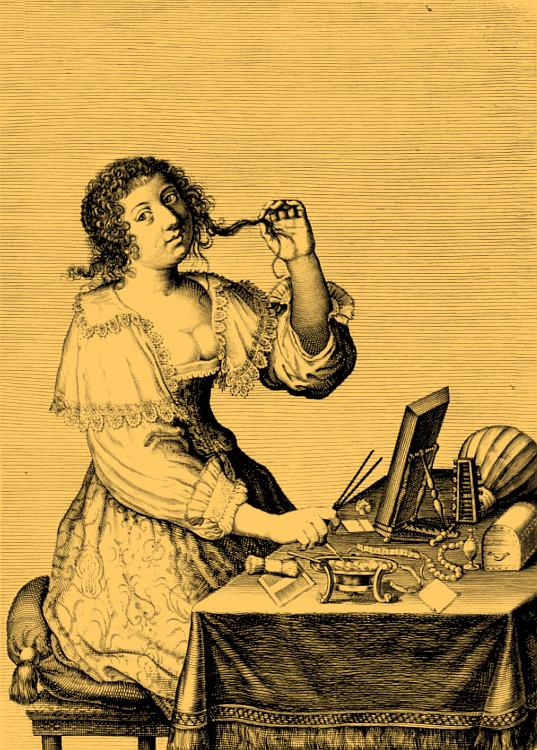

The two young gentleman are inseparable. They live together and philosophize together. I have already noticed that those among men who distinguish themselves quite coarsely will always attract adherents. These two scholarly eccentrics are beginning to attract attention, albeit only among those who themselves would like to be eccentric. Our two idlers are already having their hair cut or are letting it hang over their shoulders, en oreilles de chien, [18] as the French quite aptly call it, and “scholarly discernment” has become quite the thing for the past few months.
Our learned coquettes similarly take note of the newcomers. Among them, Frau von C** ranks at the top of the list.
(Carlo Goldoni, Opere complete, vol. 11, Commedie die Carlo Goldoni [Venice 1911], 39]):
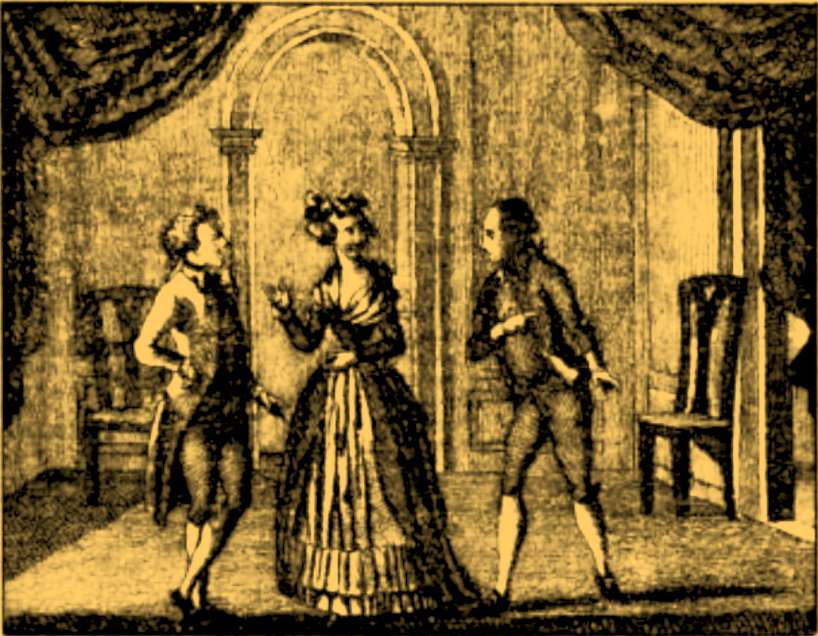
I must describe her for you. She is young, pretty, rich, reads a great deal, dances like an angel, has considerable wit and many talents, and yet even more than the usual — considerably more — how should I put it? — coquetterie is French and has a second meaning I do not intend.
Somewhere I read that coquetterie has been translated as Gefallsucht [the addiction of being excessively anxious to please], a translation I prefer to the French not least also because of its similarity to Fallsucht [epilepsy], for when women subject to this addiction of wanting to please everyone fail to do so with this or that person, their shock approaches that of epilepsy; where this illness is not so severe, I call it Gefallseuche [the disease of being excessively anxious to please].
(“Die Galante” [“The coquette”], Allmanach auf 1786 [Vienna]; Inhaltsverzeichnis deutscher Almanache, Theodor Springmann Stiftung; the incipit to the accompanying poem reads: “Mornings, late, when the coquette awakens, does she hasten to her dressing table”):
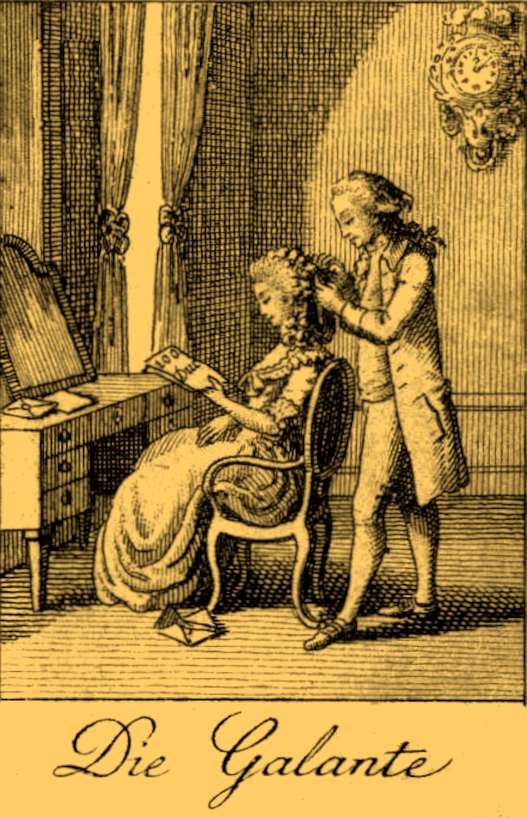
So, the entire soul of Frau von C** is full of such excessive anxiety to please. To be pleasing is her entire goal, and love merely a means for her to do so. She turns her house into a place of assembly for refined society precisely so she can shine there. She is always surrounded by half dozens of worshipers who simply have to make do with each other as best they can.
(Carlo Goldoni, Opere complete, vol. 1, Commedie die Carlo Goldoni [Venice 1907], 481):

If she sees a young man who distinguishes himself in any way, she does not rest until she has tethered him, too, to her triumphal carriage. She engages every means to appropriate him: beauty, talent, innocent favors, thus leading the inexperienced youth to the point that he is mortally in love and cannot live without her.
(Carlo Goldoni, Opere complete, vol. 8, Commedie die Carlo Goldoni [Venice 1910], 483):

She, however, remains cold, and even if she is swept up by emotion, it is never genuine love, but rather what the French call amour de tête [love of/in the head/mind], which a pretty woman can take off like a dress. Her asseverations of love consist in mere clichés. She is constantly in a state of grand love, grand emotion, grand rapture.
(Carlo Goldoni, Opere complete, vol. 4, Commedie die Carlo Goldoni [Venice 1909], 19):
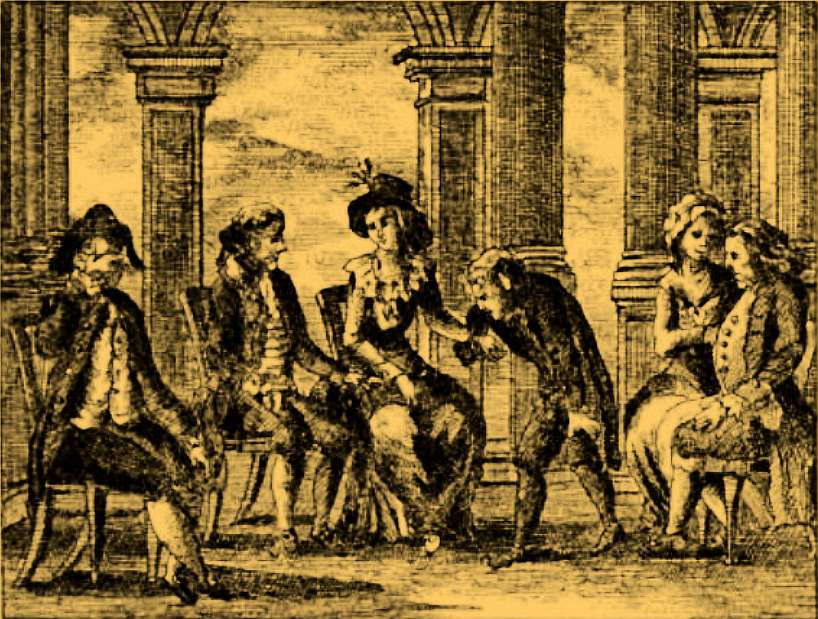
That applies to the youths who do not yet know that the grandest stirrings of the human heart reside deep within, and exhibit only modest signs, signs noticeable only to those who feel the same way. These good young men believe that they are sincerely, deeply loved.
(Carlo Goldoni, Opere complete, vol. 15, Commedie die Carlo Goldoni [Venice 1912], 163):

But this has nothing to do with love, but only with vanity; for Frau von C** loves only herself. What she calls love consists solely in an exchange of tender words, genteel flattery, in a word: in that particular gallantry du bon vieux tems de Louis XIV. [19]
(Carlo Goldoni, Opere complete, vol. 4, Commedie die Carlo Goldoni [Venice 1909], 369):

And these young people believe all this is a miracle who-knows-how-new.
Well, Gustav became infatuated with this woman. He sees her daily, hangs on her gaze when in society with her. By contrast, she distinguishes him from all her other admirers, even from the long-haired Herr von X**, on which account I do compliment her powers of discernment, though also — just listen — Herr von X**’s own discernment of women. He was ensnared like the others — but it seems he quickly saw what was happening and just as quickly withdrew, which may well have humiliated her in secret, since she cannot spare even an insignificant lover, and even less so one who has made a bit of a stir in town.
(Carlo Goldoni, Opere complete, vol. 8, Commedie die Carlo Goldoni [Venice 1910], 243):

Whether I am pleased with the fact that Gustav has fallen into the net of this beautiful collector of youths? All things considered: yes. For even if he but exchanges witty flatteries with her, it is at least the beginning of a change in his way of thinking. To wit, he must, after all, depart, as it were, from his own ego, in which he is currently caught. If he wants to be pleasing, he will have to let off a bit from his unwise wisdom. Do you not agree? Men are a proud lot! Feeling so sublime, so wise, so almighty, so self-sufficient. We women need the entirety of our good hearts in order to guide men such that they become even tolerable.
(Carlo Goldoni, Opere complete, vol. 2, Commedie die Carlo Goldoni [Venice 1908], 349):

But whenever such masculine disposition enters into such creatures that are themselves not yet men, they become despairing distortions, imperious without being masters, wise without wisdom; and what little they do have sits as poorly with them as does the hairdo on these two young men, which is always either too short or too long. Frau von C** is allegedly already, as they say, putting our Gustav out to pasture. She will soon find a new lover who must be corralled, [20] and my dear Gustav will wonder how he ended up being cast into the heap of castoffs and will, despite his wide-open eyes, not believe what he is seeing.
(Carlo Goldoni, Opere complete, vol. 5, Commedie die Carlo Goldoni [Venice 1909], 49):

Or maybe I am hoping for something even better. The truth of his own character will eventually prompt him to see the makeup on her own character, and for him that will be an important nota bene. [21] But what if such does not lead him to self-understanding? What if in the end he still believes himself to be a reasonable person simply because he is always talking so much about understanding and reason? That would be ill for him indeed. Let us hope for the best.
I almost believe that Frau von C** is ruining our Gustav even more. She listens ever so patiently to his philosophy and especially to his high aesthetics — which is what he calls this thing with which he decides en dernier ressort [22] about the value of painters and poets, and instructs us concerning that which alone and exclusively ought to be pleasing to us, and otherwise nothing — under threat of punishment — that might displease him.
(Carlo Goldoni, Opere complete, vol. 15, Commedie die Carlo Goldoni [Venice 1912], 51):

To wit, he is quite busy proving what always pleases us, has always pleased us and still pleases us, ought not please us, and does not please us, — namely, rather muddled poems he has brought along with him from his sublime school, and which are but so-so — that ought to please us by virtue of the necessary inclination of the human spirit and disposition . . .
This woman’s flattery has a twofold purpose, that much is easy to discern. For she learns quite facilely how one is to shine in the most recent learned and scholarly fashion, and thereby makes Gustav quite her own through her pleasing and accommodating behavior. He worships her like a goddess in human form.
(Carlo Goldoni, Opere complete, vol. 15, Commedie die Carlo Goldoni [Venice 1912], 261):

You would hardly believe how beautifully this high philosophy becomes her dainty little face once she puts it on. She talks about knowledge, opinions, considerations, and about ought and may and about respect for the law as if she were talking about a paté.
I was recently in conversation with Frau von Q**. Everyone was there, including Herr von X**, in long hair and long trousers, and — it goes without saying — Gustav accompanied by Frau von C**. Forsooth, forsooth, her diminutive little face is indeed dainty. She was wearing a coquelicot caftan — note well: the fiery color of truth! — with a pale yellow dress underneath, a pouf à la Bertin, and also a high esprit. [23] All these things together gave me the impression of philosophical pretension.
And everyone was staring at the woman as well. Hardly had everyone taken their seats when the two gentlemen soon took control of the conversation, and the rest were all ears; for what else was to be done other than listen where such mellifluous speech was to be heard! All sorts of things about beauty and poets and Greekness and how our poets ought to be Greek and that hardly any couple was properly Greek and the other little more than nothing. Priceless. Little Madam C** said little. She was probably chagrined that she had not put on a Greek garment. . . .
You must know that for some months now Frau von C** assembles a weekly salon of wit in her home each Friday, in which one negotiates and barters belletristic wit.
(Carlo Goldoni, Opere complete, Commedie die Carlo Goldoni [Venice], uncertain volume):
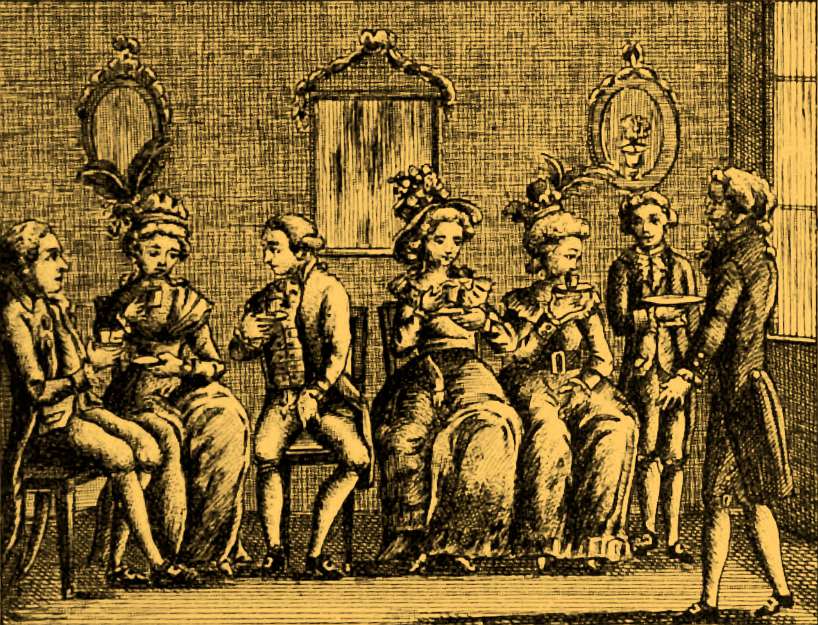
Gustav is still very fond of me, so he introduced me at Frau von C**’s last Friday, for he so wishes that I be initiated into the sacred customs of the Goddess of Vanity. So who was there? Can one count the flies in August that swarm around apple tarts?
The women constituted the more insignificant part of the company. The little witch, Madam C**, does not know herself well. She wants only female faces around her who stand far beneath her with respect to beauty and wit. So be it! . . .
Things were in a far better state with the men. All the lovers of Frau von C** were present, a great many in the blossom of youth, charming blonds, and bearded scholars. Although they all appeared quite different, in every countenance one could discern an element of self-satisfaction like a universal characteristic in a family portrait. . . .
(Carlo Goldoni, Opere complete, vol. 15, Commedie die Carlo Goldoni [Venice 1912], 177):
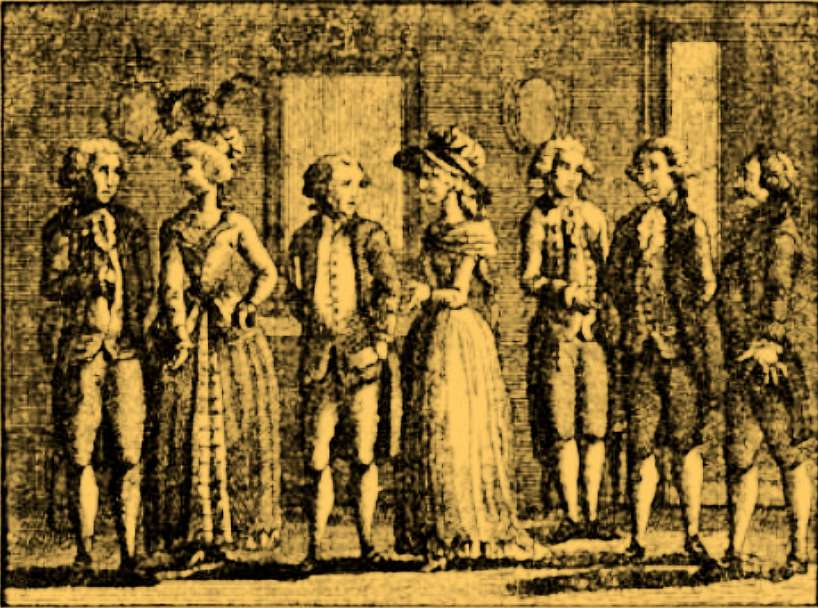
On the other side [of Frau von C**] sat Herr †, a poet and connoisseur of art, a gaunt, pale, haggard young man who spoke even less. Instead he did nothing but constantly gaze into the beautiful eyes of his neighbor, and was quite right doing so, for he is an enthusiastic afficionado of the beautiful and has immersed himself in the beauties of Raphael. But the poor fellow has seen nothing of Raphael but copper engravings and inferior copies, and yet he daily sits face to face with the beautiful Frau von C**. What an effect that must have on his gaunt soul! . . .
(Carlo Goldoni, Opere complete, vol. 15, Commedie die Carlo Goldoni [Venice 1912], 293):

So, Doctor Pandolfo [Friedrich Schlegel], with whom I recently conversed a bit, is neither large nor small, blond nor brunette, thin nor fat; spoke neither fast nor slow, strongly nor softly, high nor low; turned his feet neither in nor out; was dressed neither fashionably nor unfashionably. . . . With a professor like Doctor Pandolfo, nothing, absolutely nothing is external; everything resides in the interior, in the inner ego. How fortunate that such a Pandolfo takes on any external form, lest we see him not at all, since actually everything about him is invisible; the spirit alone sees it, and his spirit sees itself . . .
Happy Frau von C** is robbing me of Gustav. He is utterly in her snare, woven from a chain of flowers. They are together every day. . . . But just listen! When I really think about it, it is wholly impertinent that Gustav does not even come see me when the tea society meets at my house. Surely his dear Madam C** would not hold that against him, since then it would not even appear that he came merely for my sake. But she wants to control him alone, and the world is to be informed of such. But let me tell you: Madam C** is an insufferable creature; I have already made a note in my diary to remind me to hate her very soon!
(Carlo Goldoni, Opere complete, vol. 9, Commedie die Carlo Goldoni [Venice 1910], 525):

Notes
[*] Initial illustration from Il festino, in Carlo Goldoni, Opere complete, vol. 11, Commedie die Carlo Goldoni (Venice 1911), 23. Back.
[1] See supplementary appendix 250.1. Back.
[2] Koberstein, vol. 4, part 2, 847–48, including fn 14 on 847, in which he provides the brief summary of the piece; see ibid., 847–58 for an exhaustive examination of this feud with Nicolai, who to his credit was an almost indefatigable adversary. He will reappear in volume 2 of this edition in a feud with Fichte. Back.
[3] “Fragmente,” Athenaeum (1798) 179–322; Eng. Friedrich Schlegel’s Lucinde and the Fragments, trans. Peter Firchow (Minneapolis 1971), 161–240. Back.
[4] An allusion to Tieck’s Der gestiefelte Kater, ein Kindermärchen in drey Akten mit Zwischenspielen, einem Prologe und Epiloge von Peter Leberecht, in Volksmärchen, vol. 2 (Berlin 1797), 1–139:
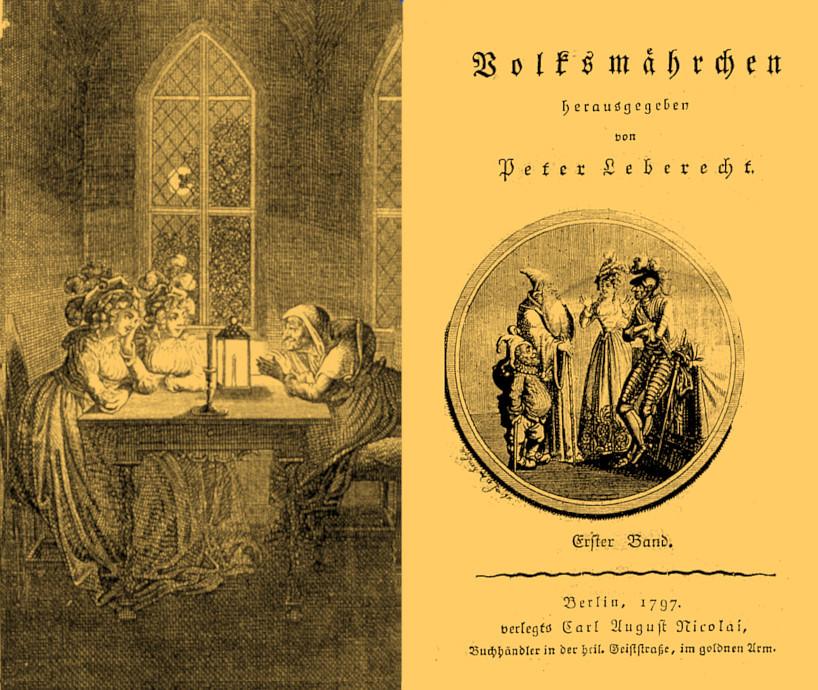
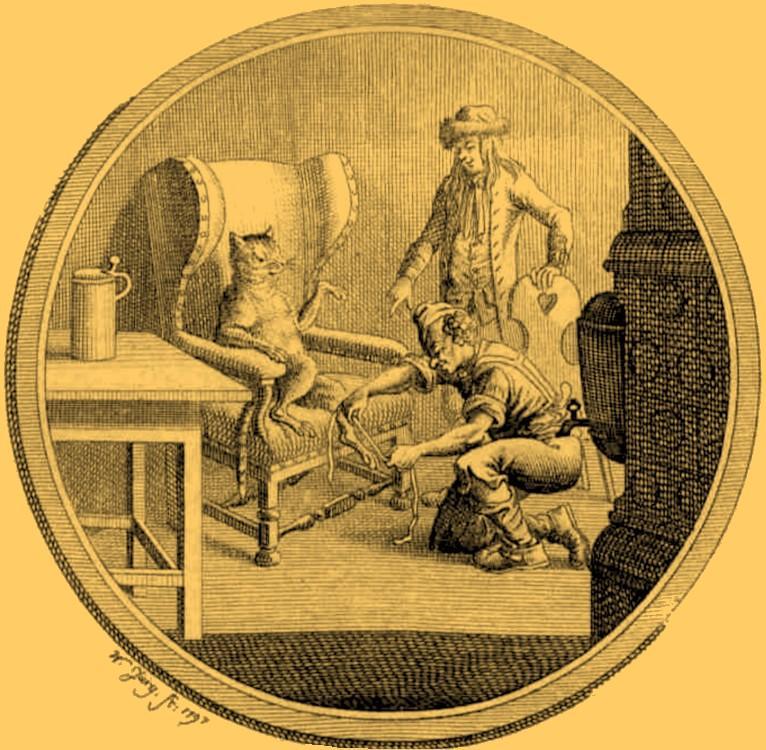
[5] See below for the complete review. Back.
[6] Wilhelm’s withdrawal and the overall break with the Allgemeine Literatur-Zeitung was considerably more complicated, though the favorable review of Nicolai’s piece there was certainly an aggravating factor in view of the journal’s utter lack of reviews of the Schlegels. Back.
[7] Prinz Zerbino, oder, Die Reise nach dem guten Geschmack (Leipzig, Jena 1799); also in Poetisches Journal (Jena 1800). Back.
[8] Zeitschrift für spekulative Physik (1800) 1, 49–99, here: 88–89, where, among other things, Schelling refers to the Vertraute Briefe von Adelheid B** as “a piece in which the old fop tormented himself trying to imitate the epistolary voice of a young woman.” Back.
[9] Athenaeum (1799) 2:333. Back.
[10] Athenaeum (1799) 333–34. Back.
[11] “Effectuary,” a medicinal preparation usually made with sugar, syrup, or honey. Back.
[12] Friedrich Nicolai, Beschreibung einer Reise durch Deutschland und die Schweiz, im Jahre 1781. Nebst Bemerkungen über Gelehrsamkeit, Industrie, Religion und Sitten, 12 vols. (Berlin, Stettin 1783–96). Back.
[13] Something that causes or induces sweat. Back.
[14] Athenaeum (1799) 337–38. Back.
[15] See Caroline’s letter to Huber on 22 November 1799 (letter 256): “and now, after having been ashamed even to talk about anything he [Nicolai] had written for years, now you suddenly review precisely this book, a book directed against the Schlegels.” Back.
[16] Jakob Minor, “Christoph Friedrich Nicolai,” in Lessings Jugendfreunde, ed. Jacob Minor, Deutsche National-Literatur: Historisch kritische Ausgabe 72 (Berlin, Stuttgart 1883), 277–386, here 306–9. Back.
[17] Vertraute Briefe von Adelheid B** an ihre Freundin Julie S** (Berlin, Stettin 1799), 49–93.
Illustrations of coquettes: (1) Mich. Van Lochom, La luthiste coquette (17th cent.); Bibliothèque nationale de France; engraved by Le Blond as Dame à son luth et à sa coiffure; (2) anonymous, “La coquette” (ca. 1750). Back.
[18] Fr., “in dog’s ears,” hair with bangs, sometimes parted, across the eyebrows and left long at the sides to cover the ears, in back lifted and fastened into a bun like that of prisoners being led to the guillotine; fashionable in France 1795–99, worn esp. by the incroyables, the “unbelievables,” as a protest against aristocratic fashion (Louis Darcis and Carle Vernet, Les Incroyables (Paris 1796); Bibliothèque nationale de France):

See Henry Swinburne, “The Courts of Europe at the Close of the Last Century,” The Quarterly Review, lxviii (June & September, 1841), 145–76, here 170:
The men were clean, many in English dresses, but there were also a good many extravagants, or incroyables, en oreilles de chien; that is, with their hair plaited and done up very tight behind, like an old-fashioned chignon, and in front two curls or tresses a foot long, just parted in the middle of the forehead, and hanging down the cheeks upon the waistcoat. Back.
[19] Fr., “of the good old days of Louis XIV.” Back.
[20] See Dorothea Schlegel to Karoline Paulus on 3 June 1805 (letter 393e):
Although I already heard from students here that Madam Schelling had acquired a certain Doctor Köhler, I was having trouble believing it and just passed it off as idle gossip. He is allegedly a wholly ordinary person as far as intellect is concerned; from what I heard, he is, however, a handsome young fellow who is earning some money. That is indeed completely mad! But it does remind me of what Wilhelm said back when her relationship with Schelling was starting to manifest itself, “Oh,” he said with extraordinary ire, “she has not yet finished, her next lover is still running around in a little hussar’s uniform! “— What fun it would be were she unfaithful to Schelling!
(Daniel Nikolaus Chodowiecki, Ich habe dir etwas mitgebracht [ca. 1800]; Herzog August Bibliothek; Museums./Signatur Graph. A1: 969):
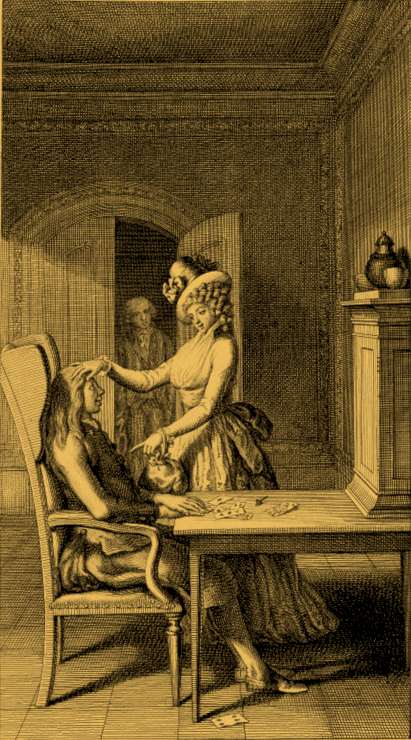
[21] Latin, “note well.” Back.
[22] Fr., “without appeal, in the last resort.” Back.
[23] Nicolai’s footnote: “A caftan is an open dress; a pouff a kind of bosom collar; an esprit a headpiece with a heron feather or other fine feathers.” Back.
Translation © 2013 Doug Stott
